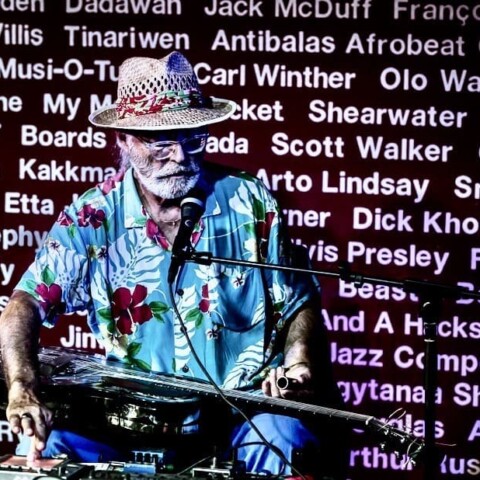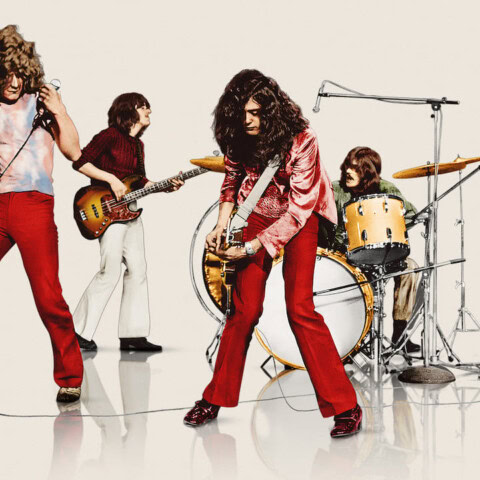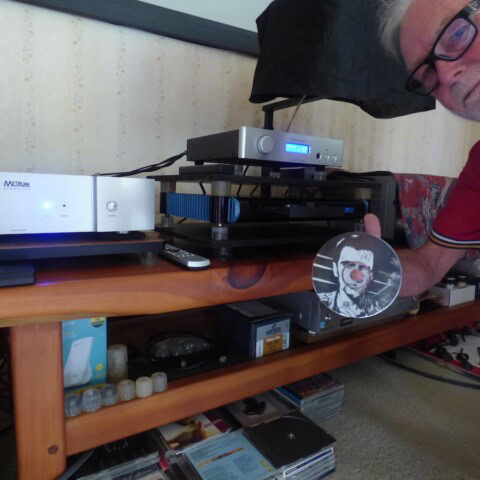Every day in May, to mark NZ Music Month, Gary Steel presents something local from his considerable behind. Personal archive, that is. Today’s surprise item?
Schtung
First published in the Strip, October 1996.
Schtung In Hong Kong
 THE MYSTERIOUS GROUP, Schtung, formed in Wellington in 1976. In a move that makes legendary snail’s pace bands like Pink Floyd and Blue Nile look positively prolific, 20 years on Schtung have finally recorded their second album. Well, sort of.
THE MYSTERIOUS GROUP, Schtung, formed in Wellington in 1976. In a move that makes legendary snail’s pace bands like Pink Floyd and Blue Nile look positively prolific, 20 years on Schtung have finally recorded their second album. Well, sort of.
Formed by Wellington College pals Morton Wilson and Andrew Hagen, Schtung were a bunch of underground scruffs who adored early Split Enz and played a style that mixed up 10cc with Supertramp, and Peter Gabriel with The Beatles, along with a dose of surreal humour. Schtung was destined to produce only one (self-titled) album; neglected, genuinely off-the-wall brilliant and long unavailable. They had disappeared off the scene by the end of the ‘70s, consigned forever to oblivion – or so we thought.
Schtung has just signed a multi-album distribution deal with huge multi-national record company MCA. Only, this time, Schtung is based in Hong Kong, and it’s not a group, but a new record company about to unleash a slew of exotic, Asian-influenced CDs on the world market.
 When Schtung faltered at the end of the ‘70s, Morton Wilson and Andrew Hagen turned their talents to scoring movies (Sam Pillsbury’s Scarecrow is a standout), nature documentaries, and earning real money writing advertising jingles. By ’82, however, the NZ film industry was back in the doldrums. The government had filled the loophole that had allowed films to be used as tax write-offs, which drastically reduced the number made, along with film soundtrack work. On a tip, the twosome followed their noses to Hong Kong, where, within a month, they had completed a movie.
When Schtung faltered at the end of the ‘70s, Morton Wilson and Andrew Hagen turned their talents to scoring movies (Sam Pillsbury’s Scarecrow is a standout), nature documentaries, and earning real money writing advertising jingles. By ’82, however, the NZ film industry was back in the doldrums. The government had filled the loophole that had allowed films to be used as tax write-offs, which drastically reduced the number made, along with film soundtrack work. On a tip, the twosome followed their noses to Hong Kong, where, within a month, they had completed a movie.
 “They crank them out one a week,” says Morton. “It was fun, but we realised it wasn’t exactly what we wanted to do for the rest of our lives.”
“They crank them out one a week,” says Morton. “It was fun, but we realised it wasn’t exactly what we wanted to do for the rest of our lives.”
Instead, they moved into the luxurious world of Hong Kong television advertising.
“Unlike New Zealand, where it was sheep dip and chocolate biscuits,” says Morton, “here, it’s all Rolex watches and high fashion. The quality of the film-making is exceptional; all image-driven. Because it’s a bilingual city, these commercials are aimed at tourists and visitors, and they didn’t want a voice-over, so it was beautiful pictures and beautiful music.”
In time, “the Schtung boys” formed a network of studios and musicians which allowed them to become one of the biggest music companies in Asia. Currently, Schtung has eight hi-tech digital recording studios, in different Asian cities, and one in LA, where Andrew Hagan now lives.
A couple of years ago, Morton realised he had some free studio time – why not use it to do something purely creative? The first project, on which he worked for three years, was with studio partner Peter Millward, an ex-rock muso from the UK. This album – released under the name Celestial – is a tame but tasty little number, which marries the beautiful sounds of Asian classical music with a relaxed groove, in a style which reminds one of Enigma and Deep Forest, but with a rather more authentic feel.
 Peter’s project involved recording (and sometimes sampling) Hong Kong’s celebrated erhu (Chinese violin) exponent, Hsiao Hung, jazz guitarist Eugene Pao, Nepalese classical trio Sur Sudha, and others, then shaping his own contemporary ambience. At its best, the exotic sounds have the evocative, beautifully melancholy of Ryuichi Sakamoto’s appropriation of Chinese music for the soundtrack of The Last Emperor.
Peter’s project involved recording (and sometimes sampling) Hong Kong’s celebrated erhu (Chinese violin) exponent, Hsiao Hung, jazz guitarist Eugene Pao, Nepalese classical trio Sur Sudha, and others, then shaping his own contemporary ambience. At its best, the exotic sounds have the evocative, beautifully melancholy of Ryuichi Sakamoto’s appropriation of Chinese music for the soundtrack of The Last Emperor.
“We’re doing stuff for ourselves, really,” says Peter. “Schtung is basically a home for strange musicians; a kind of family. I just started recording tunes I’d heard people playing, got people in whom I knew, and it grew in a very organic way. Half of the tracks are traditional melodies and the other six are original. I put it all together, but it’s a collection of a lot of people, really.”
Peter is heavily into current sampling technology, but mainly takes samples from instruments he has recorded in the studio.
“I use a lot of real-time performances, but I also sample things which somebody has come in and recorded. I sample it and play about with it. It’s all about different textures, really.”
 Celestial is the launch project for the Schtung record label, but it’s only one of many widely different projects. These include several traditional albums and Morton’s guitar-oriented album (his big influences are John McLaughlin and Pat Metheny). It’s a potentially exciting potpourri which, in a strange way – considering NZ’s recent influx of Asian migrants – reflects our own ongoing multi-culturalism. Schtung attempts to utilise traditional Asian influences respectfully, but doesn’t blanch at the idea of fusing them with contemporaneous styles, using the latest technology.
Celestial is the launch project for the Schtung record label, but it’s only one of many widely different projects. These include several traditional albums and Morton’s guitar-oriented album (his big influences are John McLaughlin and Pat Metheny). It’s a potentially exciting potpourri which, in a strange way – considering NZ’s recent influx of Asian migrants – reflects our own ongoing multi-culturalism. Schtung attempts to utilise traditional Asian influences respectfully, but doesn’t blanch at the idea of fusing them with contemporaneous styles, using the latest technology.
Morton tells a story about a special inauguration he attended in Kathmandu to celebrate the very first CD of Nepalese traditional music.
“I’m up on stage with a flower garland around my neck, and this old gentleman, one of the masters of music in Nepal, got up and made a speech after I’d said my bit. ‘The tabla must not play with the jazz drum!’ he said. I thought: ‘Well, he’s not into crossover, but this album’s traditional.’ Then, they finish the inauguration with a choreographed dance and I’m expecting the music to be traditional, but on comes the Celestial track! ‘Oh no!’, and he looks at me with a pained look which screams ‘WHY?’ There will always be some bloody-minded purist who will say it’s just wrong to use a sitar with an electric guitar, but there will be fusion and crossover AND strictly traditional, and none of them will lose anything because of it.”
Potentially, Schtung (the label) could herald a kind of WOMAD-style scene with an Asian flair, which is a long way from the whiter-than-white progressive rock group from Wellington. For all that, though, Morton isn’t embarrassed by his formative days in New Zealand, and stands by the one and only Schtung album (though he ruefully mentions the master tapes are forever lost, making a CD reissue unlikely). He longs to visit New Zealand – he hasn’t been back to Wellington for 17 years – and has fond memories of the Schtung group days.
“I remember playing a Radio Hauraki gig in the park in Auckland with punk group the Suburban Reptiles. It was just us and them, hippies vs punks, and everyone was – how shall we say – herbally prepared. They were so urbane and civilised though, and such really nice guys. They were upper middle-class boys with an education, having a bit of fun!”
He’s happily settled in Hong Kong – despite the impending Chinese takeover in ’97 – where he is married to a Chinese woman and has an eight year old son.
“So, here we are,” he says, “almost 20 years later, making record again, which is all I ever wanted to do in the first place. We’ve now just formed Schtung Holdings British Virgin Islands, the Schtung group of companies. Who would have guessed?”
• Spirit House, by Celestial, is out now through MCA.
Note from the author: How very odd. I’ve always loved that Schtung album, even though it appeared just at the wrong time, with punk on the rise in NZ. I wonder what happened to the Hong Kong Schtung empire? I hear that Andrew Hagen is back in Wellington after all these years.
* Don’t forget to check out www.audioculture.co.nz after May 31, where you’ll find a vast repository of NZ music history.
















Funnily enough the remaining five members of the band have been chatting this week – Universal is set to re-release The Schtung Album digitally, which is nice. A bootleg has been available for years online but official is always good. Andrew has one foot in NZ and one in LA, I am still in HK. We closed the Singapore & Shanghai studios because the model has changed – most composers / songwriters are working with Logic or ProTools at home so the necessity for full-blown studios declined. One of our former Engineers in SNG has a small studio now and we can work with ex-Schtung composers / players there when a project comes along and we have a similar situation with our former Studio Manager in Shanghai, and a leading Shanghainese Composer who worked with us for a few years. HK is still active – modest studio in Causeway Bay (there’s a Schtung Facebook page, BTW) and a network of composers and artistes here and scattered around Asia. Andrew & I have collaborated on a few album projects over the years and we all keep in touch – no immediate threat of a ‘the second Schtung album’ yet but who knows?